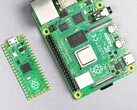The Ubo Pod is a type of smart speaker, but it differs significantly from smart speakers such as those from Amazon. The model houses a Raspberry Pi 4 or Raspberry Pi 5 in a modular case designed to maximize extendability and repairability. The scope of delivery also includes an IPS screen with a screen diagonal of only 1.54 inches and a resolution of 240 x 240.
Two microphones and two speakers with an output of two watts each are installed, allowing acoustic interaction with the model. A camera with a resolution of 5 MP is on board. A keypad consisting of seven buttons is provided for button operation. The microphones can be deactivated at the hardware level via a dedicated button, and the camera has a "physical privacy curtain". The 130 x 99 x 52 millimeter device also comes with a temperature sensor, an IR receiver and an IR transmitter.
Users can configure the Ubo Pod in many different ways, allowing for the creation of individualized applications. As part of a crowdfunding campaign that involves a significant financial risk for supporters, the base price is $109 (not including shipping), but this does not include a Raspberry Pi.
I have been active as a journalist for over 10 years, most of it in the field of technology. I worked for Tom’s Hardware and ComputerBase, among others, and have been working for Notebookcheck since 2017. My current focus is particularly on mini PCs and single-board computers such as the Raspberry Pi – so in other words, compact systems with a lot of potential. In addition, I have a soft spot for all kinds of wearables, especially smartwatches. My main profession is as a laboratory engineer, which is why neither scientific contexts nor the interpretation of complex measurements are foreign to me.
Translator: Jacob Fisher - Translator
- 2816 articles published on Notebookcheck since 2022
Growing up in regional Australia, I first became acquainted with computers in my early teens after a broken leg from a football (soccer) match temporarily condemned me to a predominately indoor lifestyle. Soon afterwards I was building my own systems. Now I live in Germany, having moved here in 2014, where I study philosophy and anthropology. I am particularly fascinated by how computer technology has fundamentally and dramatically reshaped human culture, and how it continues to do so.



























